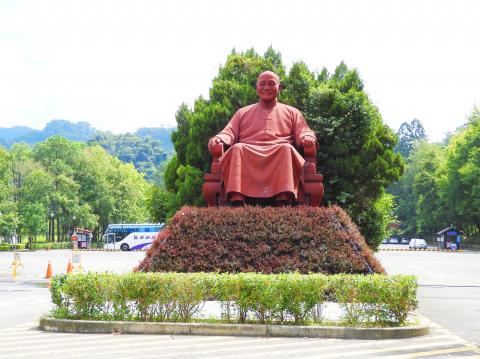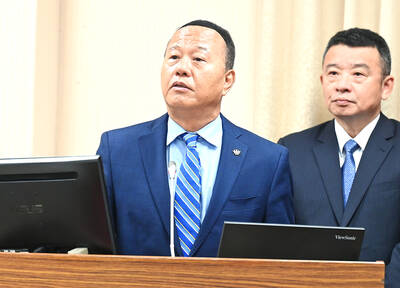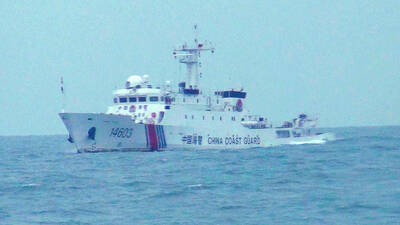The Transitional Justice Commission is considering donating statues of Chiang Kai-shek (蔣介石) to willing communities, repurposing them as art or replacing them with statues of locally born people, commission Acting Chairwoman Yang Tsui (楊翠) said on Wednesday.
There is more than one way to deal with authoritarian symbols such as statues of Chiang Kai-shek and former president Chiang Ching-kuo (蔣經國), she said.
That could mean removing them, replacing them with statues of local historical or literary figures, converting them into installation art or giving them to former military dependents’ villages that might be interested in “adopting” them, she said.

Photo: Chen Yu-fu, Taipei Times
While removing the statues would be an option, it would not be the only one, she said.
The commission would consult experts and other government agencies before deciding what to do with the statues, she added.
While speaking to reporters in Taipei, Yang also called for more social dialogue on the issue.
The commission is planning to host a series of forums nationwide after the Nov. 24 nine-in-one elections, she said.
It would invite local residents to discuss the relationship between authoritarian symbols, the private sphere and everyday life, and ask local historians to explore the relationship between authoritarian symbols and historical memory, she said.
Through these discussions, the commission would gather ideas for dealing with the authoritarian symbols, she added.
There are more than 1,000 statues of Chiang Kai-shek in Taiwan, the commission said in its latest update.
However, this is not a final number, as the Hualien County Government and the Keelung City Government have yet to report the number of Chiang Kai-shek statues in their jurisdictions, Yang said, adding that they are expected to do so after the elections.
In related news, a representative from the Executive Yuan appeared in court on Wednesday after the Chinese Nationalist Party (KMT) caucus applied for a provisional injunction to terminate the appointment of Yang as acting commission chair due to concerns over the legality of the move.
The KMT caucus said the regulations on the formation of the commission do not specify how an acting chairperson or deputy chairperson should be appointed.
The representative said Yang’s appointment by Premier William Lai (賴清德) last month was an internal personnel matter that the judiciary should not interfere with.
If the commission had no acting chairperson, it would be unable to carry on its daily activities, they said.
The presiding judge asked the representative which law requires a chairperson to be present when the commission meets, asking: “Is there no one else who can chair the meeting apart from the commission chairperson?”
As the representative did not give an answer, the court asked for a response within three days.

VIGILANCE: The military is paying close attention to actions that might damage peace and stability in the region, the deputy minister of national defense said The People’s Republic of China (PRC) might consider initiating a hack on Taiwanese networks on May 20, the day of the inauguration ceremony of president-elect William Lai (賴清德), sources familiar with cross-strait issues said. While US Secretary of State Anthony Blinken’s statement of the US expectation “that all sides will conduct themselves with restraint and prudence in the period ahead” would prevent military actions by China, Beijing could still try to sabotage Taiwan’s inauguration ceremony, the source said. China might gain access to the video screens outside of the Presidential Office Building and display embarrassing messages from Beijing, such as congratulating Lai

Four China Coast Guard ships briefly sailed through prohibited waters near Kinmen County, Taipei said, urging Beijing to stop actions that endanger navigation safety. The Chinese ships entered waters south of Kinmen, 5km from the Chinese city of Xiamen, at about 3:30pm on Monday, the Coast Guard Administration said in a statement later the same day. The ships “sailed out of our prohibited and restricted waters” about an hour later, the agency said, urging Beijing to immediately stop “behavior that endangers navigation safety.” Ministry of National Defense spokesman Sun Li-fang (孫立方) yesterday told reporters that Taiwan would boost support to the Coast Guard

GLOBAL: The slogan would be advertised in popular tourist destinations in North America and Europe, such as Champs-Elysees and Times Square, the agency said “Taiwan: Waves of Wonder” is to be the country’s new tourism slogan for the next 10 years, the Tourism Administration said yesterday, adding that it would be showcased in commercials at the Olympic Games in Paris and other major cities and travel fairs around the world. The new slogan, logo and theme song, which were unveiled at a news conference in Taipei, marked the agency’s latest effort to attract 10 million international visitors to Taiwan this year, a goal that it readjusted earlier this year, as China has yet to lift its travel ban to Taiwan. The administration created the “Taiwan: Touch

BOOST TO SPORTS? The Executive Yuan said that the amendment was introduced to attract professionals to Taiwan, and increase the incentives for naturalization The Legislative Yuan yesterday passed on third reading an amendment to the Nationality Act (國籍法) that would reduce the minimum residency period required for highly skilled professionals to apply for naturalization from three to two continuous years, with a minimum of 183 days in Taiwan each year. The 183-day requirement does not apply if an eligible applicant has lived legally in the territory of the Republic of China for more than five continuous years. Taiwan’s professional basketball leagues are expected to benefit from the amendments, which would allow them to recruit more players from overseas. Prior to the passage of the amendment, the